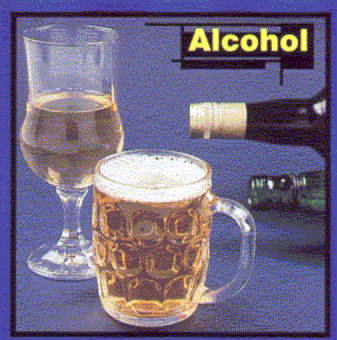
Alcohol:
The effect of alcohol changes each times it is taken. It can make people feel happy or sad. People can get tired or over active. It can also reduce concentration and lower inhibitions. In large amounts it can lead to unconsciousness and even coma. Alcohol is used with other illicit drugs. It is a leading cause of road accidents and is a risk factor for liver disease, heart disease and brain damage.

Cigarettes:
Smoking cigarettes can cause headaches, coughs and a sick feeling in the stomach. Smoking costs money that could be saved for a car. It results in bad breath and a dry mouth. It also can lead to asthma.
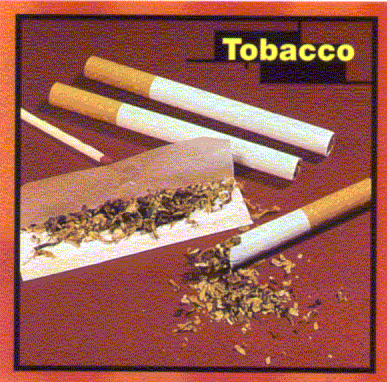
Cannabis:
Smoking cannabis can make you feel relaxed and more hungry than usual. It can cause hallucinations where you see and hear things that aren't really there. It can also cause a feeling of slowing down of time, a dry mouth, dizziness, red eyes, and slow reflexes. Long term heavy cannabis use is likely to have a negative effect on your health. These effects include:
Respiratory diseases such as bronchitis and cancers commonly associated with smokers.
Some loss of memory and mental capacity
People can become dependent on cannabis and have great difficulty controlling their use of the drug.
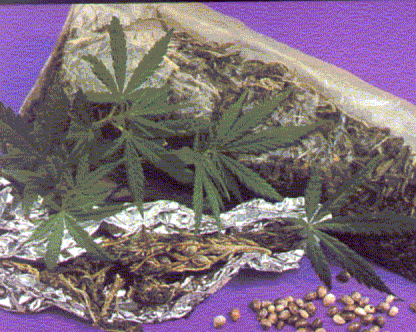
Inhalants/Solvents
Some drugs turn to gas in air and when the fumes are inhaled can cause user to feel "high". These are inhalants. The term 'chroming' or 'glue sniffing' is used to cover all forms of inhalant use including:
Glue
Aerosol spray cans
Lighter fluid
Paint thinner
Chrome based paint or petrol
Using many times may cause double vision, a ringing noise in the ears, vomiting and diarrhea, sneezing, a runny nose, coughing and your breathing may slow down. Like most street drugs, inhalants are addictive although almost all young people who try inhalants only use them once or twice. Inhalants are extremely dangerous and may case death.

Speed/Amphetamines
These drugs literally "speed you up". They may be injected, taken in tablet form or inhaled. They can cause a dry mouth, anxiety, disturbed sleep, hunger, irritability, paranoia, panic attacks, blurred vision, loss of coordination and aggressiveness leading to fights. Needle use also carries the risk of HIV/AIDS, Hepatitis B & C.

Ecstasy:
This type of drug can cause you to see things that are not seen by other people and produces a feeling of tranquillity, increased confidence and feeling close to people which is why it's also known as 'The love drug'. Many people take ecstasy at 'Dance' or 'Rave' parties. The next day, a severe 'hangover' may leave the user feeling 'burnt out'. Symptoms include: loss of appetite, sleep problems, aching and not thinking straight.

Hallucinogens:
Hallucinogens are any mind-altering substance that distorts the user's sensations, thinking, self-awareness, emotions and perceptions of reality. Hallucinogens may also have a depressant effect. LSD, the best known of the hallucinogens and as a synthetic drug, is one of the most potent mind-altering chemicals. LSD is most commonly seen in ticket form or the tickets incorporated into some other dose from such as a tablet, capsule or occasionally confectionary.
More than any other drug, the effects of hallucinogens vary greatly from person to person and from occasion to occasion of use. Typical effects include dilated pupils, rapid heart rate, changes in perception of sight, sound, touch, smell, taste, and space. People may feel relaxed and a sense of
well-being. Others may feel nausea and loss of appetite, chills, flushing, shaking, confusion and on a 'bad trip' acute panic.
Cocaine:
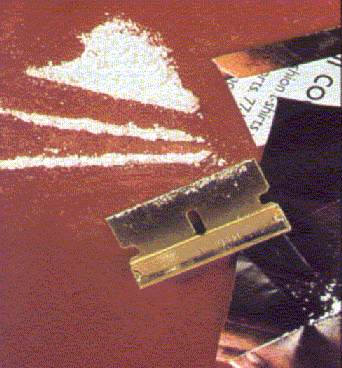
Cocaine is also known as 'Coke' or 'Charlie'. Cocaine in this form is usually snorted or injected. Cocaine is often mixed or 'cut' with other substances or sugar to increase the profitability of a deal.
Cocaine is highly addictive and as with other stimulants, 'coke' reduces hunger, thirst and natural needs such as rest, food, and water. Death can occur as a result of overdose or an accident while under the influence of the drug.
Heroin:

Heroin is derived from the opium poppy and usually comes in a rock or powdered form which is generally white or pink/beige in colour. Heroin is usually injected into a vein. Re-using or sharing needles increases risk of Hepatitis and AIDS which are serious, life-threatening diseases. Complications associated with heroin use can include tolerance which means that the user needs more and more quantity to get the same effect. Using heroin can result in both psychological and physical dependence on the drug. Heroin addiction is extremely expensive and is a major reason for many crimes as the addict needs more and more money to support the 'habit' and just feel normal. Life can become an endless circle of finding the money, scoring the drug and usage.
Pharmaceuticals:
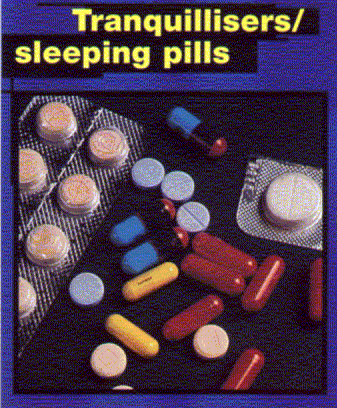
Many people abuse prescription drugs and pharmaceuticals such as Valium and Serepax. Taking such substances without a doctor's advice can be harmful. Users are particularly at risk when they combine these drugs with other substances, including alcohol, speed, heroin and ecstasy. Pain such as headaches can be due to stress, pressure, studying and exams. Other ways to relieve stress are relaxation techniques, such as massage and rest instead of using drugs like Panadol and Aspirin continually.